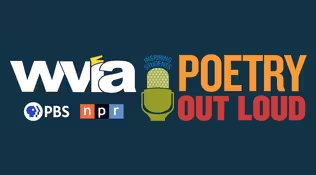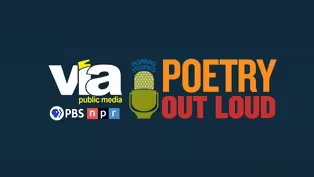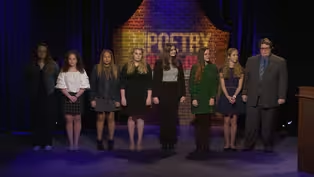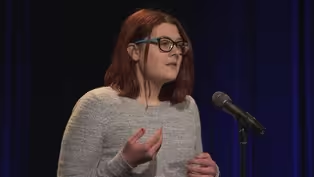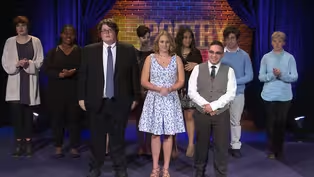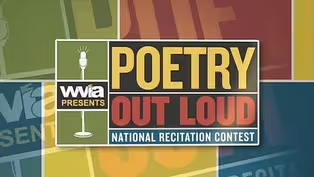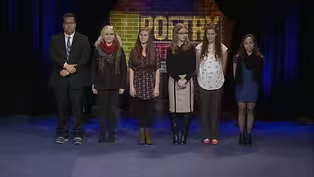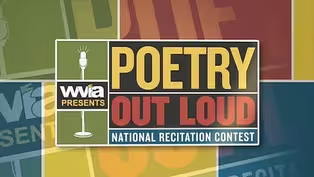WVIA Special Presentations
2022 Poetry Out Loud Regional Competition
Season 2022 Episode 6 | 45m 29sVideo has Closed Captions
WVIA is proud to host the NEPA regional competition
Poetry Out Loud is a national program from which high school students learn about great poetry through memorization and recitation. WVIA is proud to host the NEPA regional competition from which our winner will advance to the state championship in Harrisburg.
Problems playing video? | Closed Captioning Feedback
Problems playing video? | Closed Captioning Feedback
WVIA Special Presentations is a local public television program presented by WVIA
WVIA Special Presentations
2022 Poetry Out Loud Regional Competition
Season 2022 Episode 6 | 45m 29sVideo has Closed Captions
Poetry Out Loud is a national program from which high school students learn about great poetry through memorization and recitation. WVIA is proud to host the NEPA regional competition from which our winner will advance to the state championship in Harrisburg.
Problems playing video? | Closed Captioning Feedback
How to Watch WVIA Special Presentations
WVIA Special Presentations is available to stream on pbs.org and the free PBS App, available on iPhone, Apple TV, Android TV, Android smartphones, Amazon Fire TV, Amazon Fire Tablet, Roku, Samsung Smart TV, and Vizio.
Providing Support for PBS.org
Learn Moreabout PBS online sponsorshipMore from This Collection
The Poetry Out Loud Regional Competition is supported by the Pennsylvania Council on the Arts and the Arts in Education. Support for this regional competition funded by the Overlook Estate Foundation, Northeastern Educational Intermediate Unit (NEIU #19), and WVIA.
2021 Poetry Out Loud Regional Competition
Video has Closed Captions
WVIA is proud to host the NEPA regional competition (46m 43s)
2020 Poetry Out Loud Regional Competition
Video has Closed Captions
2020 Poetry Out Loud Regional Competition (45m)
2019 Poetry Out Loud Regional Competition
Video has Closed Captions
2019 Poetry Out Loud Regional Competition (47m)
2018 Poetry Out Loud Regional Competition
Video has Closed Captions
2018 Poetry Out Loud Regional Competition (47m)
2017 Poetry Out Loud Regional Competition
Video has Closed Captions
April is National Poetry Month and WVIA is celebrating all month long. (43m)
2016 Poetry Out Loud Regional Competition
Video has Closed Captions
2016 Poetry Out Loud Regional Competition (34m 29s)
2015 Poetry Out Loud Regional Competition
Video has Closed Captions
2015 Poetry Out Loud Regional Competition (40m 5s)
2014 Poetry Out Loud Regional Competition
Video has Closed Captions
2014 Poetry Out Loud Regional Competition (48m 54s)
Providing Support for PBS.org
Learn Moreabout PBS online sponsorship- [Announcer] Poetry Out Loud is a program of the National Endowment for the Arts and supported locally by the Arts Education Program of the NEIU, AIENEPA.
The project is funded by the Pennsylvania Council on the Arts, Lackawanna County and with additional generous funds from The Overlook Estate Foundation.
(upbeat music) - Good evening, and welcome to the Poetry Out Loud regional competition.
I am your host, Kirsten Smith.
Poetry Out Loud is a national program from which high school students learn about great poetry through memorization and recitation.
One of the students here tonight will advance to the state competition in Harrisburg and perhaps even to the national finals in Washington, DC in April, where the state winners will compete for a grand prize scholarship.
This year, each student was called in to privately and safely recite their three poems.
The rules were clear, only one reading of each poem, prompts when needed.
When the filming was completed, we sent the videos to the judges for their assessments.
Thank you to all participating teachers throughout Northeastern Pennsylvania, for developing creative ways to hold your in-school competitions and generate enthusiasm in your students.
Our seven contestants are all winners representing their high schools.
They compete in three rounds and will award certificates to all participants and prizes to the top finishers.
In this competition, students will be judged on physical presence and posture, voice projection, and articulation, appropriate gestures that enhance the recitation, level of difficulty and evidence of understanding.
And now on with the competition.
It is my pleasure to introduce our talented students who will be competing tonight.
From Abington Heights High School, Robert Tricarico.
(swooshing) - "Ozymandias" by Percy Bysshe Shelley.
I met a traveler from an antique land, who said, two vast and trunkless legs of stone stand in the desert near them, on the sand, half sunk a shattered visage lies, whose frown and wrinkled lip, and sneer of cold command, tell that its sculptor well those passions read which yet remain stomped on these lifeless things, the hand that mocked them, the heart that fed, and on the pedestal, these words appear, My name is Ozymandias, King of Kings, look on my works, ye mighty, and despair!
Nothing beside remains.
Round the decay of that colossal wreck, boundless and bare the lone and level sands stretch far away.
(swooshing) - From Hazleton Area Arts and Humanities Academy, Kiera Lee Skuntz.
(swooshing) - "The Mortician in San Francisco" by Randall Mann.
This may sound queer, but in 1985, I held the delicate hands of Dan White.
I prepared him for burial, by then, Harvey Milk was made monument, no, myth, by the years since he was shot.
I remember when Harvey was shot, twenty, and I knew I was queer.
Those were the years, Levi's and leather jackets, holding hands on Castro Street, cheering for Harvey Milk, elected on the same day as Dan White.
I often wonder about Supervisor White, who fatally shot Mayor Moscone and Supervisor Milk, who was one of us, a Castro queer.
May 21, 1979, a jury hands down the sentence, seven years, in truth, five years for ex-cop, ex-fireman Dan White, for the blood on his hands when he confessed that he had shot the mayor and the queer, a few men in blue cheered.
And Harvey Milk?
Why cry over spilled milk, some wondered, semi-privately, for years it meant "one less queer."
The jurors turned to White.
If just the mayor had been shot, Dan might have had trouble on his hands but the twelve who held his life in their hands maybe didn't mind the death of Harvey Milk, maybe, the second murder offered him a shot at serving only a few years.
In the end, he committed suicide, this Dan White.
And he was made presentable by a queer.
(swooshing) - From North Pocono High School, Aurora Milagros LaFever.
(swooshing) - "After Working 60 Hours Again For What Reason" by Bob Hicok.
The best job I had was moving a stone from one side of the road to the other.
This required a permit which required a bribe, the bribe took all my salary yet because I hadn't finished the job, I had no salary and to pay the bribe, I took a job moving the stone the other way.
Because the official wanted his bribe, he gave me a permit for the second job.
When I pointed out that the work could be best completed if I did nothing, he complimented my brain and wrote a letter to my employer, suggesting promotion on stationery bearing the wings of a raptor spread flight over a mountain smaller than the bird.
My boss, fearing my intelligence, paid me to sleep on the sofa and take lunch with the official who required a bribe to keep anything from being done.
When I told my parents, they wrote my brother to come home from university to be slapped on the back of the head.
Dutifully he arrived and bowed to receive his instruction.
At which point, sense entered his body and he asked what I could do by way of a job.
I pointed out there were stones everywhere, trying not to move.
All it took was a little gumption to be the man who didn't move them.
It was harder to explain the intricacies of not obtaining a permit to not do this.
Just yesterday, he got up at dawn and shaved as if the lack of hair on his face has anything to do with the appearance of food on an empty table.
(swooshing) - From MMI Preparatory, Jillian McGeehin.
(swooshing) - "Experience" by Edith Wharton.
Like Crusoe with the bootless gold we stand upon the desert verge of death and say "What shall avail the woes of yesterday to buy tomorrow's wisdom, in the land whose currency is strange unto our hand?
In life's small market, they had served to pay some late-found rapture, could we but delay till time hath matched our means to our demand."
But otherwise fate wills it, for, behold, our gathered strength of individual pain, when time's long alchemy hath made it gold, dies with us, hoarded all these years in vain.
Since those that might be heir to it, the mould renew and coin themselves new griefs again.
O death, we come full-handed to thy gate, rich with strange burden of the mingled years, gains and renunciations, mirth and tears, and love's oblivion, and remembering hate, nor know we what compulsion laid such freight upon our souls and shall our hopes and fears buy nothing of thee, death?
Behold our wares and sell us the one joy for which we wait.
Had we lived longer, like had such for sale, with the last coin of sorrow purchased cheap, but now we stand before thy shadowy pale, and all our longings lie within thy keep.
Death, can it be the years shall naught avail?
"Not so," Death answered, "they shall purchase sleep."
(swooshing) - From Riverside High School, Jennifer Genell.
(swooshing) - "The Glories of our Blood and State" by James Shirley.
The glories of our blood and state are shadows, not substantial things.
There is no armor against fate.
Death lays his icy hand on kings, scepter and crown must tumble down, and in the dust be equal made with the poor crooked scythe and spade.
Some men with swords may reap the field, and plant fresh laurels where they kill, but their strong nerves at last must yield, they tame but one another, still early or late, they stoop to fate, and must give up their murmuring breath when they, pale captives, creep to death.
The garlands wither on your brow, then boast no more your mighty deeds!
Upon death's purple altar now, see where the victor-victim bleeds.
Your heads must come to the cold tomb, only the actions of the just smell sweet and blossom in their dust.
(swooshing) - From Wallenpaupack Area High School, Lucas Ryan.
(swooshing) - "Kubla Khan" Samuel Taylor Coleridge.
In Xanadu did Kubla Khan, a stately pleasure-dome decree, where Alph, the sacred river, ran through caverns measureless to man down to a sunless sea.
So twice five miles of fertile ground with walls and towers were girdled round and there were gardens bright with sinuous rills, where blossomed many an incense-bearing tree.
And here were forests ancient as the hills, enfolding sunny spots of greenery.
But oh, that deep romantic chasm which slanted down the green hill athwart a cedarn cover.
A savage place as holy and enchanted as e'er beneath a waning moon was haunted by woman wailing for her demon-lover.
And from this chasm, with ceaseless turmoil seething, as if this earth in fast thick pants were breathing, a mighty fountain momently was forced, amid whose swift half-intermitted burst, huge fragments vaulted like rebounding hail or chaffy grain beneath the thresher's flail.
And 'mid these dancing rocks at once and ever, it flung up momently the sacred river.
Five miles meandering with a mazy motion through wood and dale the sacred river ran, then reached the caverns measureless to man.
And sank in tumult to a lifeless ocean and 'mid this tumult Kubla heard from far, ancestral voices prophesying war.
The shadow of the dome of pleasure floated midway on the waves, where was heard the mingled measure from the fountain and the caves.
It was a miracle of rare device, a sunny pleasure-dome with caves of ice.
A damsel with a dulcimer in a vision once I saw, it was an Abyssinian maid and on her dulcimer she played, "Singing of Mount Abora".
Could I revive within me her symphony and song, to such a deep delight 'twould win me, that with music loud and long, I will build that dome in air, that sunny dome, those caves of ice.
And all who heard should see them there, and all should cry, Beware!
Beware!
His flashing eyes, his floating hair!
Weave a circle 'round him thrice, and close your eyes with holy dread for he on honeydew hath fed and drunk the milk of Paradise.
(swooshing) - And from Maria Kaupas Academy, Philip Huffman.
(swooshing) - "I Am the People, the Mob" by Carl Sandberg.
I am the people, the mob, the crowd, the mass.
Do you know that all the great work of the world is done through me?
I am the workingman, the inventor, the maker of the world's food and clothes.
I am the audience that witnesses history.
The Napoleons come from me and the Lincolns.
They die.
And then I send forth more Napoleons and Lincolns.
I am the seed ground.
I am a prairie that will stand for much plowing.
Terrible storms pass over me.
I forget.
The best of me is sucked out and wasted.
I forget.
Everything but death comes to me and makes me work and give up what I have.
And I forget.
Sometimes I growl, shake myself and splatter a few red drops for history to remember.
Then, I forget.
When I, the people, learn to remember, when I, the people, use the lessons of yesterday and no longer forget who robbed me last year, who play me for a fool, then there will be no speaker in all the world say the name, "The People," with any fleck of a sneer in his voice or any far-off smile of derision.
The mob, the crowd, the mass, will arrive then.
(swooshing) - And now on to Round Two.
From Abington Heights High School, Robert Tricarico.
(swooshing) - "Self-Inquiry Before the Job Interview" by Gary Soto.
Did you sneeze?
Yes, I rid myself of the imposter inside me.
Did you iron your shirt?
Yes, I used the steam of mother's hate.
Did you wash your hands?
Yes, I learned my hygiene from a raccoon.
I prayed on my knees and my knees answered with pain.
I gargled.
I polished my shoes until I saw who I was.
I inflated my résumé by employing my middle name.
I walked to my interview, early, the sun like a ring on an electric stove.
I patted my hair as when I entered the wind of a revolving door.
The guard said, for a guy like you, it's the 19th floor.
The economy was up.
Flags whipped in every city plaza in America.
This I saw for myself as I rode the elevator, empty because everyone had a job but me.
Did you clean your ears?
Yes, I heard my fate in the drinking fountain's idiotic drivel.
Did you slice a banana in your daily mush?
I added a pinch of salt, two raisins to sweeten my breath.
Did you remember your pen?
I remembered my fingers when the elevator opened.
I shook hands that dripped like a dirty sea.
I found a chair and a desk.
My name tag said my name.
Through the glass ceiling, I saw the heavy rumps of CEOs.
Outside my window, the sun was a burning stove.
All of us pushing papers to keep it going.
(swooshing) - From Hazleton Area Arts and Humanities Academy, Kiera Lee Skuntz.
(swooshing) - "On the Death of Anne Bronte" by Charlotte Bronte.
There's little joy in life for me and little terror in the grave.
I've lived the parting hour to see of one I would have died to save.
Calmly to watch the failing breath, wishing each sigh might be the last.
Longing to see the shade of death o'er those belovèd features cast.
The cloud, the stillness that must part the darling of my life from me.
And then to thank God from my heart, to thank Him well and fervently.
Although I knew that we had lost the hope and glory of our life.
And now, benighted, tempest-tossed, must bear alone the weary strife.
(swooshing) - From North Pocono High School, Aurora Milagros LaFever.
(swooshing) - Brother, I've Seen Some" by Kabir translated by Arvind Krishna Mehrotra.
Brother, I've seen some astonishing sights, a lion keeping watch over pasturing cows, a mother delivered after her son was, a guru prostrated before his disciple.
Fish spawning on tree tops, a cat carrying away a dog, a gunnysack driving a bullock cart, a buffalo going out to graze, sitting on a horse, a tree with its branches in the earth, it's roots in the sky.
A tree with flowering roots.
This verse, says Kabir, is your key to the universe if you can figure it out.
(swooshing) - From MMI Preparatory, Jillian McGeehin.
(swooshing) - "I am the People, The Mob" by Carl Sandberg.
I am the people, the mob, the crowd, the mass.
Do you know that all the great work of the world is done through me?
I am the workingman, the inventor, the maker of the world's food and clothes.
I am the audience that witnesses history.
The Napoleons come from me and the Lincolns.
They die.
And then I send forth more Napoleons and Lincolns.
I am the seed ground.
I am a prairie that will stand for much plowing.
Terrible storms pass over me.
I forget.
The best of me is sucked out and wasted.
I forget.
Everything but death comes to me and makes me work and give up what I have.
And I forget.
Sometimes I growl, shake myself and spatter a few red drops for history to remember.
Then, I forget.
When I, the people, learn to remember, when I, the people, use the lessons of yesterday and no longer forget who robbed me last year, who played me for a fool, then there will be no speaker in all the world say the name, "The People," with any fleck of a sneer in his voice or any far-off smile of derision.
The mob, the crowd, the mass, will arrive then.
(swooshing) - From Riverside High School, Jennifer Genell.
(swooshing) - "The Charge of the Light Brigade by Alfred Lord Tennyson.
Half a league, half a league, half a league onward, all in the valley of death rode the Light Brigade.
"Forward, the Light Brigade!
Charge for the guns!"
he said.
Into the valley of death rode the six hundred.
"Forward, the Light Brigade!"
Was there a man dismayed?
Not though the soldier knew someone had blundered.
Theirs not to make reply, theirs not to reason why, theirs but to do and die.
Into the valley of death rode the six hundred, cannon to right of them, cannon to left of them, cannon in front of them, volleyed and thundered, stormed at with shot and shell, boldly they rode and well, into the jaws of death, into the mouth of hell rode the six hundred.
Flashed all their sabres bare, flashed as they turned in air sabring the gunners there, charging an army, while all the world wondered.
Plunged in the battery-smoke, right through the line they broke, Cossack and Russian reeled from the sabre stroke, shattered and sundered.
Then they rode back, but not, not the six hundred.
Cannon to right of them, cannon to left of them, cannon behind them volleyed and thundered, stormed at with shot and shell, while horse and hero fell.
They that had fought so well came through the jaws of death, back from the mouth of hell.
All that was left of them, left of six hundred.
When can their glory fade?
O the wild charge they made!
All the world wondered.
Honor the charge they made, honor the Light Brigade, noble six hundred.
(swooshing) - From Wallenpaupack Area High school, Lucas Ryan.
(swooshing) - "Stopping by Woods on a Snowy Evening, Robert Frost.
Whose woods these are I think I know.
His house is in the village though, he will not see me stopping here to watch his woods fill up with snow.
My little horse must think it queer to stop without a farmhouse near between the woods and frozen lake, the darkest evening of the year.
He gives his harness bells a shake to ask if there is some mistake.
The only other sound's the sweep of easy wind and downy flake.
The woods are lovely, dark and deep, but I have promises to keep.
And miles to go before I sleep, and miles to go before I sleep.
(swooshing) - And from Maria Kaupas Academy, Philip Huffman.
(swooshing) - "Epitaph" by Catherine Phillips.
On her son H.P.
at St. Syth's Church where her body also lies interred.
What on earth deserves our trust?
Youth and beauty both are dust.
Long we gathering are with pain, what one moment calls again.
Seven years childless marriage past, a son, a son is born at last, so exactly limbed and fair, full of good spirits, mean and air, as a long life promised.
Yet, in less than six weeks dead.
Too promising, too great a mind in so small room to be confined, therefore, as fit in heaven to dwell, he quickly broke the prison shell.
So the subtle alchemist, can't with Hermes' seal resist the powerful spirit's subtler flight.
But will bid him long good night.
And so the sun if it arise half so glorious as his eyes, like this infant, takes a shroud, buried in a morning cloud.
(swooshing) - And finally onto round three, from Abington Heights High School, Robert Tricarico.
(swooshing) - "Adam's Curse" by William Butler Yeats.
We sat together at one summer's end, that beautiful mild woman, your close friend and I, and you and I, and talked of poetry.
I said a line will take us hours maybe, yet, if it does not mean a moments thought our stitching and un-stitching has been naught.
Better go down upon your marrow bones and scrub a kitchen pavement or break stones like an old pauper in all kinds of weather, for to articulate sweet sounds together is to work as hard as all of these, and yet be thought an idler by the noisy set of bankers, school masters and clergy men, the martyrs call the world.
And there upon that beautiful mild woman for who's sake, there's many a one shall find out all heartache on finding that her voice is sweet and low, replied, to be born woman is to know that although they do not speak of it in school, that we must labor to be beautiful.
I said it is certain there is no fine thing since Adam's fall, but needs much laboring.
There have been lovers who thought love should be so much compounded of high courtesy that they would sigh and quote with learned looks precedents out of beautiful old books.
Yet now it seems an idle trade enough.
We sat grown quiet by the name of love.
We watched the last embers of daylight die and in the trembling blue green of the sky, a moon worn as though it had been a shell washed by times waters as they rose and fell about the stars and broke in days and years.
I had a thought for no one's, but your, ears, that you were beautiful and that I strove to love you in the old highway of love that it had all seemed happy.
And yet we'd grown as weary-hearted as that hollow moon.
(swooshing) - From Hazleton Area Arts and Humanities Academy, Kiera Lee Skuntz.
(swooshing) - "I Eat Breakfast to Begin the Day" by Zubair Ahmed.
I create time.
I cannot create time.
I'm frozen in place.
I cannot be frozen.
I'm moving, but don't notice, I notice me moving.
I pay attention to the small yet immense yet small movements that guide my limbs, my hair growth, my joint oils.
I don't think about it.
I don't feel it either.
I don't have emotions right now.
I see films of divine quality.
I don't see any films.
This black, this not black.
To me, I am, I am not to me not.
I walk with this hollowness.
I walk with this blooming.
I'm moving outward forever.
Onward, eternally inward.
I create all objects like shampoos and cats.
I create nothing, like space and anti-matter.
I resign to the clocks that keep time, I surrender to the clocks that don't keep time.
I'm sure about it.
The color white.
I'm not sure about it.
What is word?
Oh.
The loops and un-loops.
Destiny unfolds in my knees.
I eat breakfast to begin the day.
(swooshing) - From MMI Preparatory, Jillian McGeehin.
(swooshing) - "Let Evening Come" by Jane Kenyon.
Let the light of late afternoon shine through chinks in the barn, moving up the bales as the sun moves down.
Let the cricket take up chafing as a woman takes up her needles and her yarn.
Let evening come, let dew collect on the hoe abandoned in long grass.
Let the stars appear and the moon disclose her silver horn.
Let the fox go back to its sandy den.
Let the wind die down.
Let the shed go black inside.
Let evening come.
To the bottle in the ditch, to the scoop in the oats, to air in the lung, let evening come.
Let it come as it will.
And don't be afraid.
God does not leave us comfortless so let evening come.
(swooshing) - From Riverside High School, Jennifer Genell.
(swooshing) - "I Am the People, The Mob" by Carl Sandberg.
I am the people, the mob, the crowd, the mass.
Do you know that all the great work of the world is done through me?
I am the working man, the inventor, the maker of the world's food and clothes.
I am the audience that witnesses history.
The Napoleons come from me and the Lincolns.
They die.
And then I send forth more Napoleon and Lincolns.
I am the seed ground.
I'm a prairie that will stand for much plowing.
Terrible storms pass over me.
I forget.
The best of me is sucked out and wasted.
I forget.
Everything but death comes to me and makes me work and give up what I have.
And I forget.
Sometimes I growl, shake myself and spatter a few red drops for history to remember.
Then I forget.
When I, the people, learn to remember, when I, the people, use the lessons of yesterday and no longer forget who robbed me last year, who played me for a fool, then there will be no speaker in all the world say the name, "The People", with any flick of a sneer in his voice or any far-off smile of derision.
The mob, the crowd, the mass will arrive then.
(swooshing) - From Wallenpaupack Area High School, Lucas Ryan.
(swooshing) - "The Listeners", Walter de La Marez.
Is there anybody there said the traveler, knocking on the moonlit door and his horse in the silence champed the grasses of the forests ferny floor.
And a bird flew up out of the turret, above the traveler's head.
And he smote upon the door again a second time.
Is there anybody there he said, but no one descended to the traveler.
No head from the leaf-fringed sill leaned over and looked into his gray eyes where he stood perplexed and still.
But only a host of phantom listeners that dwelt in the lone house then stood listening in quiet of the moonlight to that voice from the world of men.
Stood throwing the faint moon beams on the dark stair that goes down to the empty hall, hearkening in an air stirred and shaken by the lonely travelers call.
And he felt in his heart their strangeness, their stillness answering his cry, while his horse moved cropping the dark turf, 'neath the starred and leafy sky for he suddenly smote on the door, even louder and lifting his head, tell them I came and no one answered, that I kept my word, he said.
Never the least stir made the listeners though every word he spake fell echoing through the shadowy-ness of the still house from the one man left awake.
Aye, they heard his foot upon the stirrup and the sound of iron on stone and how the silence surged softly backward when the plunging hooves were gone.
(swooshing) - And for Maria Kaupas Academy, Philip Huffman.
(swooshing) - "After Working 60 Hours Again For What Reason" by Bob Hicok.
The best job I had was moving a stone from one side of the road to the other.
This required a permit, which required a bribe.
The bribe took all my salary yet because I hadn't finished the job, I had no salary and to pay the bribe, I took a job moving the stone the other way.
Because the official wanted his bribe, he gave me a permit for the second job.
When I pointed out that the work be best completed if I did nothing, he complimented my brain and wrote a letter to my employer, suggesting promotion on stationery bearing the wings of a raptor spread in flight over a mountain smaller than the bird.
My boss, fearing my intelligence, paid me to sleep on the sofa and take lunch with the official who required a bribe to keep anything from being done.
When I told my parents, they wrote my brother to come home from university to be slapped on the back of the head.
Dutifully, he arrived and bowed to receive his instruction.
At which point sense entered his body and he asked what I could do by way of a job.
I pointed out there were stones everywhere, trying not to move.
All it took was a gumption to be the man who didn't move them.
It was hard to explain the intricacies of not obtaining a permit, to not do this.
Just yesterday, he got up at dawn and shaved, as if the lack of hair in his face has anything to do with the appearance of food on an empty table.
(swooshing) - Due to rights restrictions, we are unable to air Aurora Milagros LaFever's third recitation.
So that concludes the third round.
We would like to thank the lead teachers, students, and families for supporting these talented students.
If your school didn't participate in the competition this year, but you would like to be part of Poetry Out Loud next year, please get in touch with WVIA, we'll make sure you receive the information.
The judges have tallied the scores and now for the winners.
In third place, Jillian McGeehin, MMI Preparatory.
The Poetry Out Loud runner up is Kiera Lee Skuntz, Hazleton Area Arts and Humanities Academy.
And our winner for the Poetry Out Loud regional competition and advancing to states in Harrisburg is Philip Huffman from Maria Kaupas Academy.
Congratulations to our winners and to all of the contestants for such a wonderful job, a special thanks to the lead teachers and our judges, who certainly helped make this competition possible.
And of course it is our pleasure to thank the National Poetry Foundation and the National Endowment for the Arts, Dr. Catherine Richmond-Cullen, Liz Feist, the NEIU, Arts and Education NEPA, Lackawanna County, and The Overlook Estate Foundation, who make this broadcast possible.
WVIA is proud to showcase the talented students in our region and to provide quality arts and cultural programming and educational services, all thanks to your support.
I'm Kirsten Smith, Director of Education.
Thank you for watching and have a great night.
(upbeat music) - [Announcer] Poetry Out Loud is a program of the National Endowment for the Arts and supported locally by the Arts Education Program of the NEIU, AIENEPA.
The project is funded by the Pennsylvania Council on the Arts, Lackawanna County and with additional generous funds from The Overlook Estate Foundation.
Support for PBS provided by:
WVIA Special Presentations is a local public television program presented by WVIA
